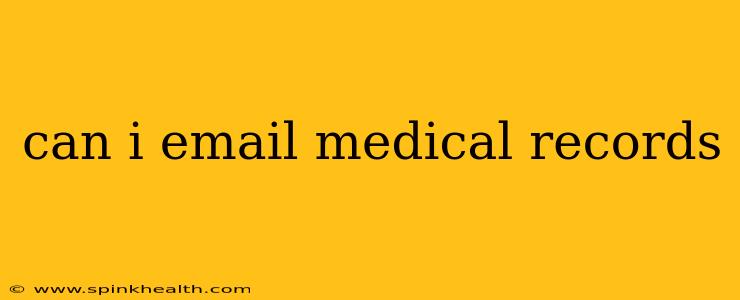Can I Email Medical Records? Navigating the Digital Landscape of Healthcare Information
The short answer is: it's complicated. While emailing seems like a convenient way to share medical records, it's fraught with legal and security concerns. Let's delve into the complexities and explore the safer alternatives.
My journey into understanding the nuances of emailing medical records began with a simple question – a friend needed to quickly share her test results with a new specialist. Her initial thought, like many, was a simple email. This sparked my investigation into the best practices and potential pitfalls.
What are the risks of emailing medical records?
This is where the story gets interesting. The primary concern is security. Email isn't inherently secure. Sensitive medical information, such as diagnoses, treatments, and personal health details, is highly vulnerable to interception and misuse if sent via unencrypted email. Imagine the consequences of a data breach – identity theft, medical fraud, and reputational damage are just a few possibilities.
Another major concern is HIPAA compliance. The Health Insurance Portability and Accountability Act (HIPAA) in the United States sets strict standards for protecting patient health information. Emailing unprotected medical records often violates these regulations, potentially leading to hefty fines for healthcare providers.
Is it ever acceptable to email medical records?
There are limited circumstances where emailing parts of your medical records might be permissible. However, it's crucial that these communications adhere to strict security protocols. For example, a doctor's office might use a secure, encrypted email system compliant with HIPAA for internal communication or sending limited information to a patient who explicitly requests it. However, this is rarely the case for general sharing.
What are the HIPAA rules regarding emailing medical records?
HIPAA regulations don't explicitly prohibit emailing medical records but place a significant emphasis on ensuring the security and privacy of Protected Health Information (PHI). Healthcare providers must implement appropriate safeguards, such as encryption, to protect PHI transmitted electronically. Simply put, emailing records without robust security measures is a violation.
What are safer alternatives to emailing medical records?
There are several much safer alternatives available:
- Patient portals: Many healthcare providers offer secure online portals where patients can access their medical records. These portals use encryption and other security measures to protect patient information.
- Faxing: While it might seem outdated, faxing remains a relatively secure method for transferring medical records, particularly when dealing with providers who haven't adopted electronic health records (EHRs).
- Secure messaging systems: Some healthcare providers use secure messaging systems that allow patients and providers to communicate privately and securely.
- In-person transfer: Carrying records in person is a very secure, albeit sometimes inconvenient option.
My research concluded that while emailing medical records might seem convenient, the risks far outweigh the benefits. The potential for security breaches and HIPAA violations makes it an unwise choice. The safer alternatives outlined above are far more reliable and compliant with regulations. Always prioritize the security and privacy of your sensitive health information.

